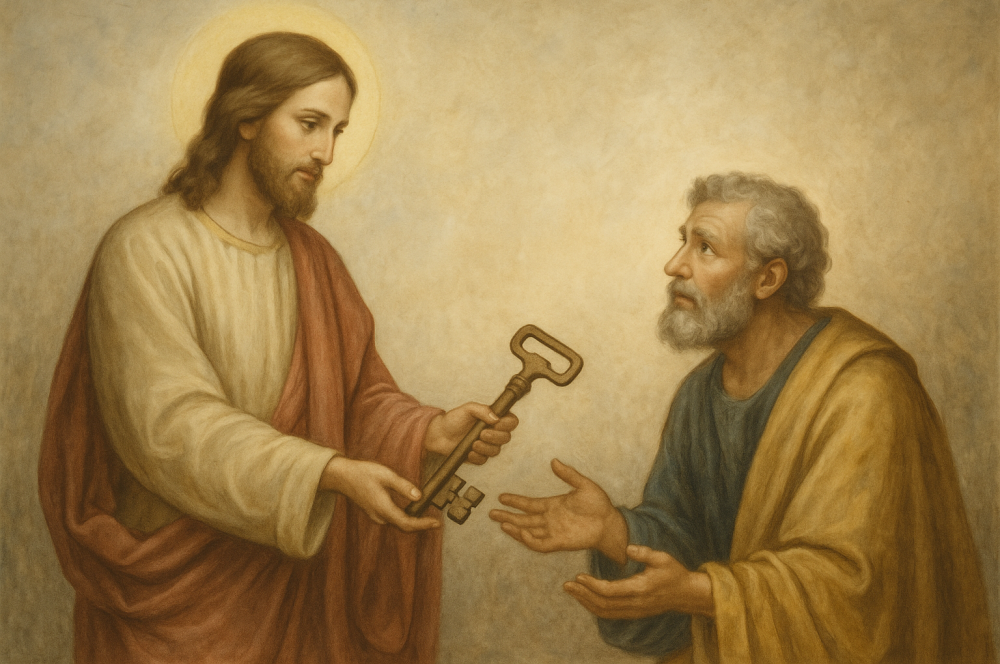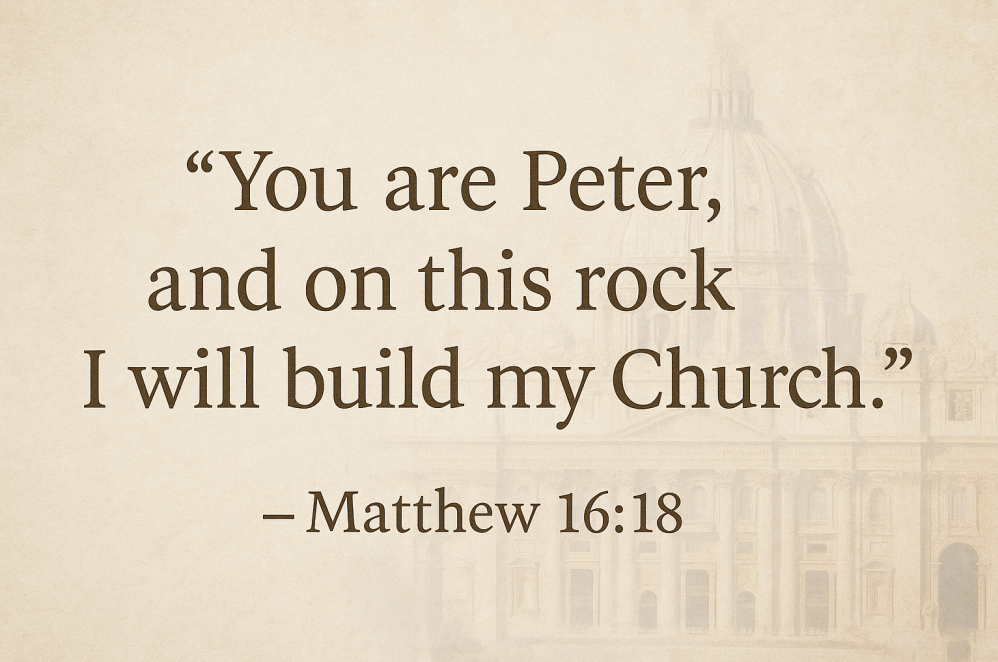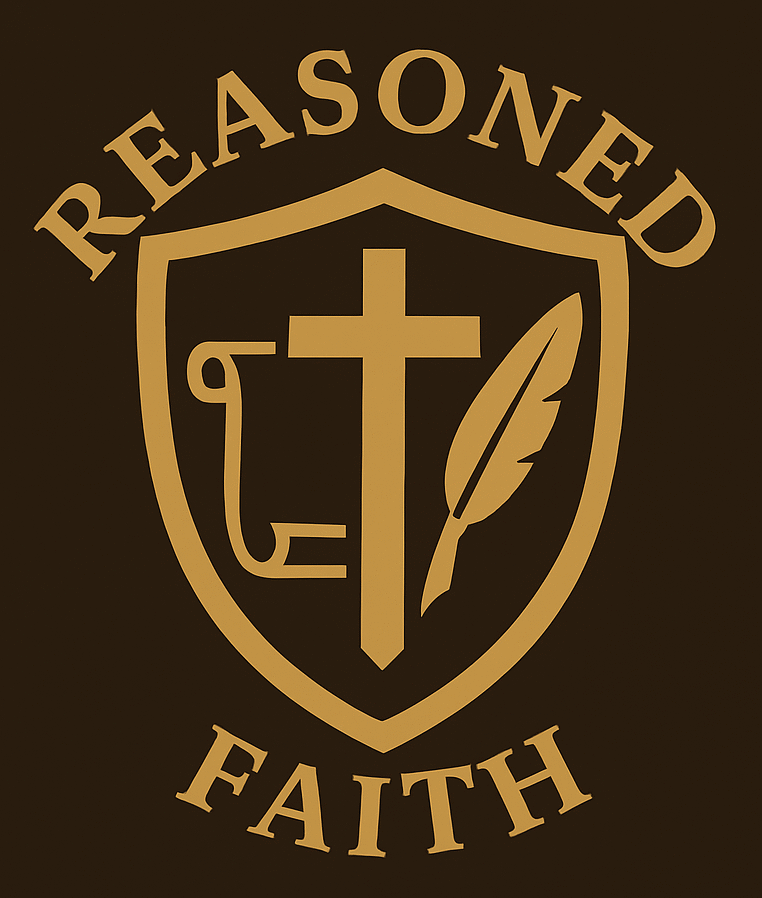
When Jesus said, “You are Peter, and on this rock I will build my Church” (Matthew 16:18), did He mean Peter himself, or just Peter’s confession of faith? This question matters more than some realize. It’s tied directly to how we understand the structure, leadership, and authority Jesus gave His Church. Let’s dig in, using Scripture, history, and basic language facts to uncover what Jesus truly meant.
Where Did the “Confession, Not Peter” Interpretation Come From?
The idea that Jesus was referring only to Peter’s confession and not Peter himself first appeared during the Protestant Reformation in the 1500s. Reformers like Martin Luther and John Calvin proposed it.
- Martin Luther suggested that “the rock” was the faith Peter professed.
- John Calvin developed the idea further, arguing that the “rock” was the faith in Christ, not Peter personally.
Why did they reinterpret it? Simple: the plain reading of the text strongly supports Peter’s special role. That was a problem for Protestants rejecting Catholic teaching on the papacy. A new interpretation was necessary to maintain their break from the authority structure of the Catholic Church.
Before the 1500s, no serious record exists of Christians reading the passage as “confession, not Peter.” The Church Fathers — East and West — overwhelmingly taught Peter was the rock. It’s not a minor point—it’s foundational to how Christians understood Church leadership.
How the “Confession” Interpretation Has Been Refuted
1. Greek Grammar and Aramaic Reality
Matthew 16:18 uses the Greek words “Petros” (Peter) and “petra” (rock). Some argue the difference in spelling matters. It doesn’t.
Jesus didn’t speak Greek to Peter. He spoke Aramaic. In Aramaic, the words are identical: “You are Kepha, and on this Kepha I will build my Church.” No clever wordplay. No distinction. No separation between Peter and “the rock.”

Even respected Protestant scholars admit this:
- D.A. Carson (evangelical Protestant): “It is better to conclude that ‘this rock’ refers to Peter himself.”
In fact, Carson adds that while the Greek distinction between “Petros” and “petra” could technically suggest a difference, the underlying Aramaic makes it crystal clear that Jesus meant Peter personally. Language evidence alone undermines the Reformation-era interpretation.
2. Early Church Fathers Agree
The early Christians, closer to the time and culture of Jesus, consistently taught Peter was the rock:
- Tertullian (c. 200 AD): the Church was “built upon Peter.”
- Cyprian of Carthage (c. 250 AD): Peter was the “source and principle of unity.”
- Origen (c. 250 AD): even while emphasizing spiritual interpretations, acknowledged Peter’s foundational role.

Other key voices include Augustine, who said, “Peter was named ‘the rock’ because he represented the Church.” Even when interpreting Peter symbolically, the Fathers still tied Peter’s person to the foundation.
You won’t find a “confession only” interpretation in any major early Christian writing. That fact alone should give pause to anyone claiming to follow “the historic Christian faith” apart from the Catholic Church.
3. Immediate Context in Matthew
Jesus continues, “I will give you the keys to the kingdom of heaven.” (Matthew 16:19)
Keys symbolize authority — personal, not abstract. In ancient Judaism, keys were a sign of being second-in-command, like the steward in Isaiah 22:22, who acted on behalf of the king. Jesus isn’t handing out keys to a confession. He’s handing them to Peter, singularly and personally.
Binding and loosing — terms tied to rabbinical authority — are also given directly to Peter. The structure is personal, not just theological. Jesus was establishing leadership, not just affirming good theology.
4. Protestant Scholars Are Shifting
Many Protestant scholars today admit the text points to Peter personally, even if they don’t embrace the Catholic view of the papacy.
- R.T. France (Anglican): “It is Peter himself who is the rock, not merely his faith or his confession.”
- Craig S. Keener, another respected Protestant scholar, notes that the early Christian readers would have understood Peter to be the rock without hesitation.
Honest exegesis — strict, Bible-only interpretation — points to Peter. Only theological bias against the papacy keeps some from acknowledging it fully.
Further Biblical Evidence for Peter’s Special Role
The idea that Peter is the rock isn’t isolated to Matthew 16:18. Other passages reinforce Peter’s unique leadership role:
- Luke 22:31-32: Jesus tells Peter that Satan has demanded to sift all the apostles, but Jesus prays specifically for Peter’s faith, and commands him to “strengthen your brethren.”
- John 21:15-17: Jesus asks Peter three times to “feed my sheep,” entrusting him with the pastoral care of the entire flock.
- Acts 1-15: Peter consistently takes the lead in the early Church, speaking for the apostles, making binding decisions, and even pronouncing the definitive ruling at the Council of Jerusalem (Acts 15).
The Bible portrays Peter not just as one among many, but as the one appointed to lead.

Why It Matters Today
This question isn’t just academic. If Peter personally was made the rock, it means Christ intended an earthly, visible leadership for His Church. Not just a loose collection of “all believers” based on invisible unity, but a structured, guided, and protected community.
It also means the idea of apostolic succession isn’t a Catholic invention — it’s biblical. Jesus established a leadership model designed to endure, not dissolve into chaos.
The Catholic Church, through apostolic succession, claims to continue the leadership Jesus gave to Peter. Denying Peter’s role weakens the Church’s visible unity and leadership that Christ Himself established.
Common Objections and Quick Responses
“Peter later denied Jesus, so he can’t be the rock.”
Peter’s failure makes him a perfect example of God’s grace. Despite his denial, Jesus reaffirms Peter’s mission after the Resurrection.
“All believers have the keys to the Kingdom.”
In a broader sense, yes (Matthew 18:18). But Peter alone receives the keys in Matthew 16:19, signifying a unique authority.
“Christ is the only true rock.”
True, Christ is the ultimate Rock (1 Corinthians 10:4). But Christ delegates His authority to leaders. Calling Peter “the rock” doesn’t diminish Christ’s role any more than calling pastors “shepherds” undermines Christ as the “Good Shepherd.”
Final Thoughts
The “confession, not Peter” view didn’t exist for 1,500 years. It was created during a time of theological rebellion to justify rejecting Catholic teaching. When you stick strictly to what the Bible says — and what history shows — Peter himself is the rock on which Christ built His Church.
The evidence is scriptural, historical, and linguistic. Jesus didn’t leave us guessing. He founded a Church with a leader, and He continues to guide it today.

Further Reading:
*This post contains affiliate links. If you make a purchase through these links, I may earn a commission at no extra cost to you. As an Amazon Associate I earn from qualifying purchases.
- “Upon This Rock: St. Peter and the Primacy of Rome in Scripture and the Early Church”
— Stephen K. Ray- Clear, biblical, and historical defense of Peter’s primacy.
- Perfect for beginners and intermediate readers.
- “Jesus, Peter, and the Keys: A Scriptural Handbook on the Papacy“
— Scott Butler, Norman Dahlgren, David Hess- Thorough Scripture-based argument.
- Organized like a reference book — very quotable.
- “Crossing the Tiber: Evangelical Protestants Discover the Historical Church”
— Stephen K. Ray- Personal conversion story, rich in biblical and patristic support for Peter and the Church.
- “The Fathers Know Best: Your Essential Guide to the Teachings of the Early Church”
— Jimmy Akin- Easy lookup of early Church teachings, including tons of quotes on Peter and authority.
- “Handed Down: The Catholic Faith of the Early Christians”
— James L. Papandrea- Accessible overview of how the early Christians viewed Church authority and Peter.

A compelling and well-researched analysis of the foundational role of Peter in the establishment of the Church, emphasizing both biblical and historical perspectives. The author effectively dismantles the “confession, not Peter” interpretation, showing how this view emerged during the Protestant Reformation in the 1500s as a response to theological disagreements, not from early Christian teachings. The use of Greek and Aramaic language evidence, along with insights from Church Fathers and respected Protestant scholars, reinforces the idea that Peter himself is the rock upon which Christ built His Church. Furthermore, the article underscores the importance of understanding this doctrine for the unity and leadership of the Church today. By addressing common objections and supporting the Catholic teaching of apostolic succession, the article encourages readers to engage with Scripture and history to grasp the profound significance of Peter’s role in Christ’s plan for His Church.
Thank you for your encouraging words! I’m glad the article helped show how Scripture and history support Peter’s foundational role in the Church. It’s a powerful reminder of Christ’s plan for unity and leadership. I appreciate you taking the time to share your thoughts and hope you’ll continue the conversation here anytime!
The question of whether Jesus built His Church on Peter himself or on Peter’s confession is one that has deep theological implications, especially when comparing Catholic and Protestant perspectives. I wonder how the original Greek construction influences this debate, does the distinction between Petros and petra carry the theological weight often assigned to it? Also, how do we reconcile this with other scriptures where Christ is called the chief cornerstone? It seems the balance between Peter’s unique role and the foundational nature of his confession isn’t always easy to parse. Could it be that both play a role: Peter as the representative leader among the apostles and his confession as the doctrinal cornerstone?
Great questions — and you’re right that both Peter and his confession matter. But context, language, and history all clarify the emphasis.
In the Greek of Jesus’ time, Petros and petra were used interchangeably. The idea that they refer to different things is a much later claim, popularized during the Protestant Reformation to avoid the implications of Peter’s unique role. In the Aramaic Jesus actually spoke, both would have been Kepha — no distinction at all: “You are Kepha, and on this Kepha I will build my Church.”
Yes, Christ is the chief cornerstone (Eph 2:20), and that’s not in conflict. He’s the foundation of salvation. But He builds on others. The apostles — including Peter — are called foundations too (Rev 21:14, Eph 2:20), with Peter uniquely given the keys and singled out in Matthew 16:18–19, Luke 22:31–32, and John 21:15–17.
And importantly, the interpretation that the “rock” referred to Peter’s confession or to Christ alone simply didn’t exist in the early Church. The Fathers overwhelmingly affirmed that Peter himself was the rock, not just his words. That interpretation was consistent for over 1,500 years until it was reimagined for polemical reasons.
So it’s not either/or. Peter is the rock Jesus personally chose, and his confession flows from that faith. But the text, the language, and the historical witness all support that Jesus built His Church on the man and the mission — not just a moment of insight.